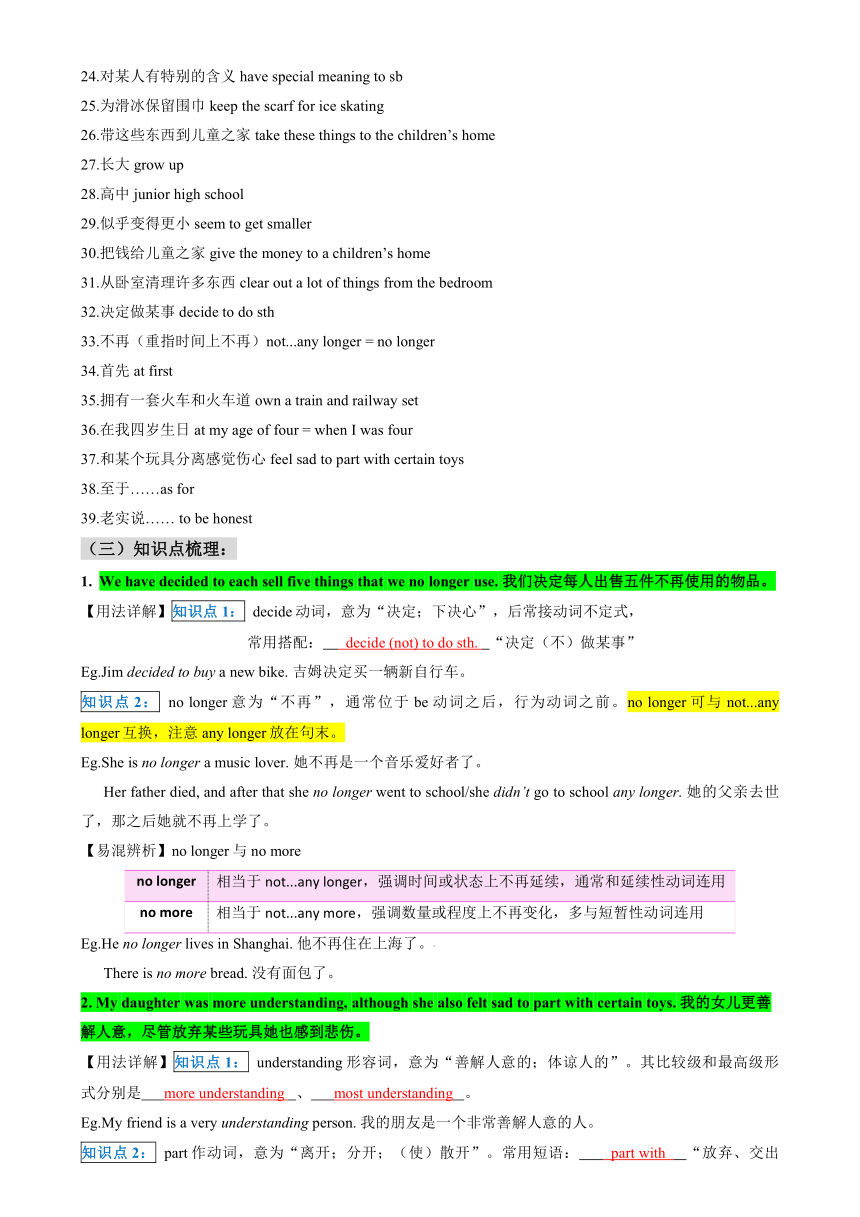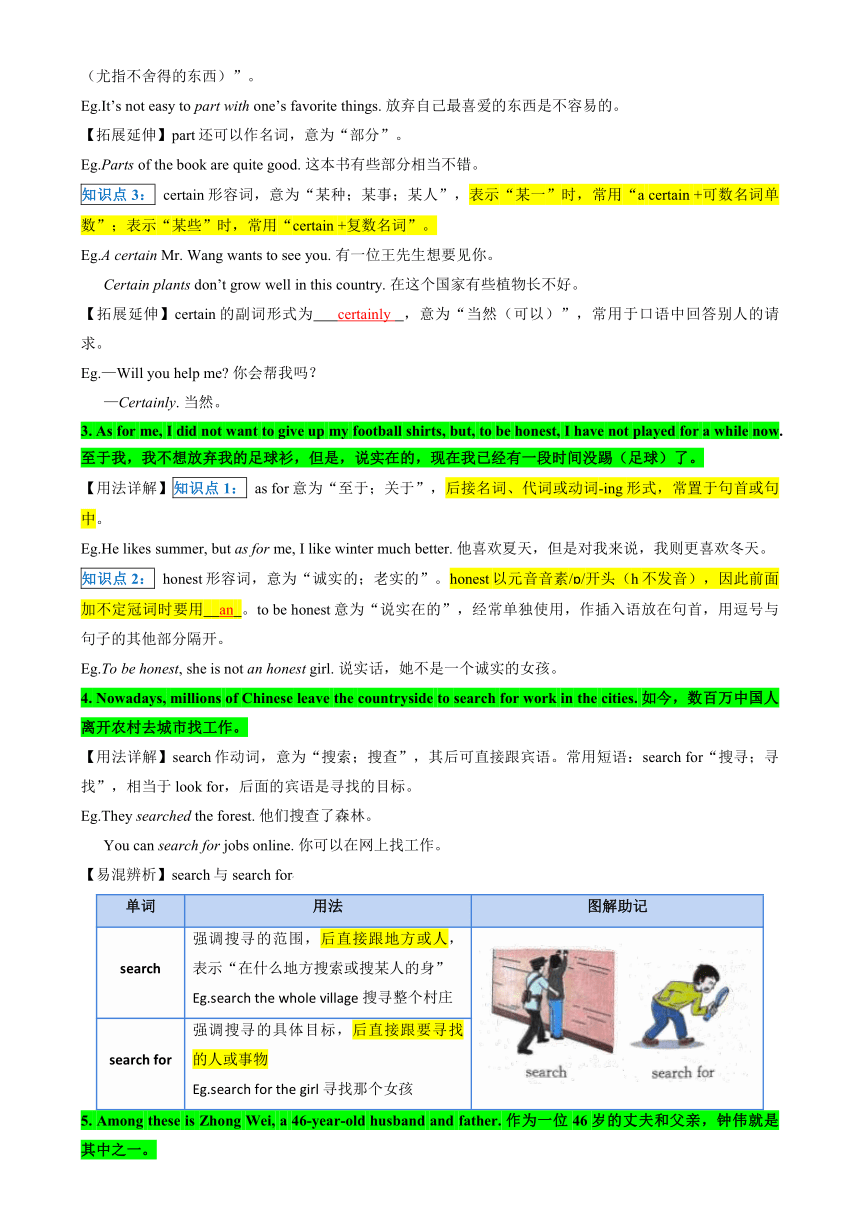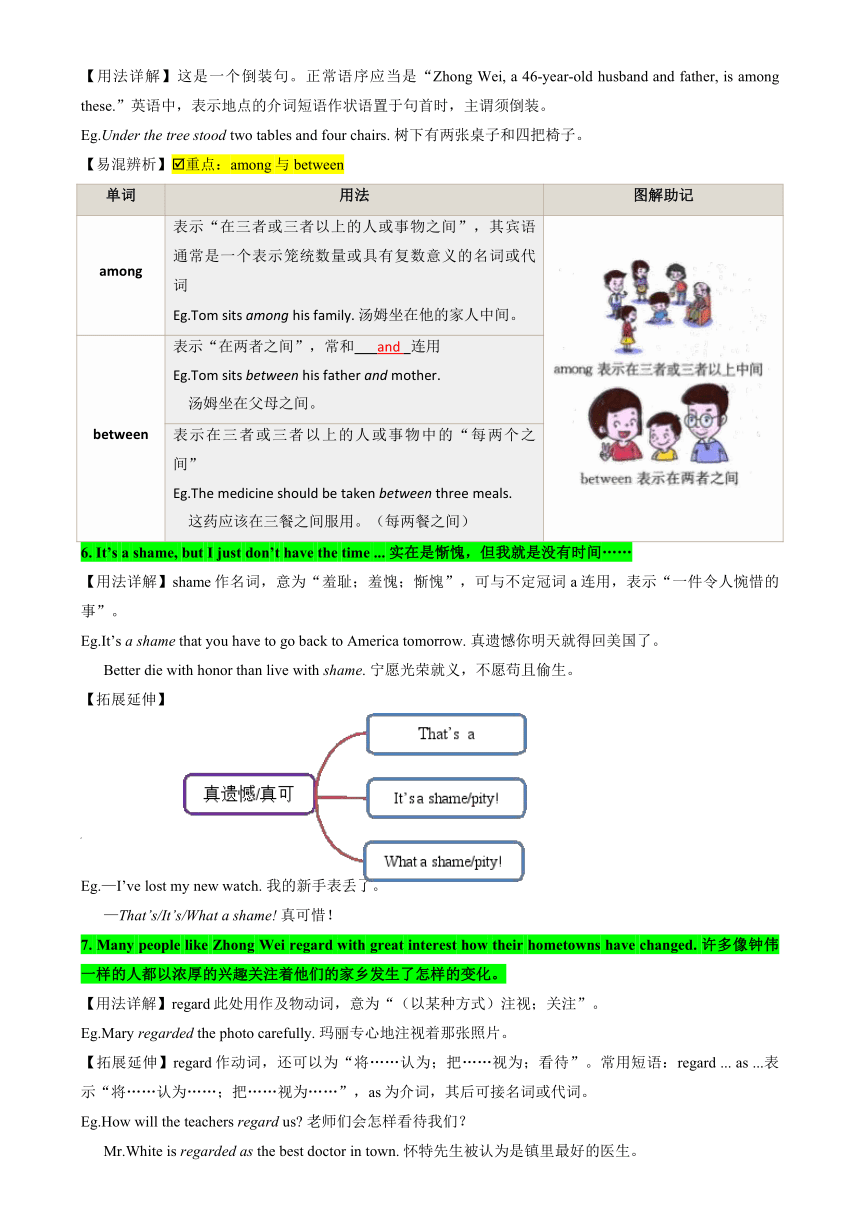2023-2024学年八年级英语下册Unit 10 I've had this bike for three years.单元知识点梳理(人教版)(含解析)
文档属性
| 名称 | 2023-2024学年八年级英语下册Unit 10 I've had this bike for three years.单元知识点梳理(人教版)(含解析) |  | |
| 格式 | docx | ||
| 文件大小 | 161.0KB | ||
| 资源类型 | 教案 | ||
| 版本资源 | 人教新目标(Go for it)版 | ||
| 科目 | 英语 | ||
| 更新时间 | 2024-05-10 05:59:17 | ||
图片预览




文档简介
Unit 10 I’ve had this bike for three years.
单元知识点梳理
(一)词汇变形小结:
memory 回忆(n.) →___memories___ (复数)
toy 玩具(n.) →____toys_____ (复数)
make 制造(v.) →____maker____ (n.)生产者
scarf 围巾(n.) →___scarves____ (复数)
soft 软的(adj.) →____softly_____ (adv.)温柔地
clear 清理;清晰地(v./adj.) →___clearly____ (adv.)清楚地
own 拥有(v.) →____owner_____ (n.)物主;主人
certain 某种;某事(adj.) →___certainly___ (adv.)当然
truth 事实(n.) →____truthful___ (adj.)诚实的;真实的
century 世纪(n.) →___centuries___ (复数)
especial 特别的(adj.) →___especially__ (adv.)尤其;特别
hold 拥有;抓住(v.) →____held______ (过去式)→____held_____ (过去分词)
(二)短语小结:
1.进行庭院出售have a yard sale
2.出售on sale
3.把自行车卖给某人sell the bike to sb
学会如何骑自行车learn how to ride a bike
5.做某事困难have trouble doing sth
带回甜美的记忆bring back sweet memories
7.记住许多单词remember a lot of words
8.把它/它们赠与需要的人give it /them away people in need
9.75美分75 cents
10.不再……(两种)not .... any more = no more
11.对某人说再见say goodbye to sb
12.许多旧玩具many old toys
13.许多旧玩具熊a lot of old toy bears
14.一个面包机a bread maker
15.12个围巾twelve scarves
16.赠送这些毛绒玩具give away these soft toys
17.欢迎到某地welcome to sp
18.几个月a couple of months
19.有点旧(两种)a bit old = kind of old
20.查看这些毛绒玩具check out these soft toys
21.棋牌游戏board game
22.浏览……look through
23.即使……even through
24.对某人有特别的含义have special meaning to sb
25.为滑冰保留围巾keep the scarf for ice skating
26.带这些东西到儿童之家take these things to the children’s home
27.长大grow up
28.高中junior high school
29.似乎变得更小seem to get smaller
30.把钱给儿童之家give the money to a children’s home
31.从卧室清理许多东西clear out a lot of things from the bedroom
32.决定做某事decide to do sth
33.不再(重指时间上不再)not...any longer = no longer
34.首先at first
35.拥有一套火车和火车道own a train and railway set
36.在我四岁生日at my age of four = when I was four
37.和某个玩具分离感觉伤心feel sad to part with certain toys
38.至于……as for
39.老实说…… to be honest
(三)知识点梳理:
We have decided to each sell five things that we no longer use. 我们决定每人出售五件不再使用的物品。
【用法详解】知识点1: decide动词,意为“决定;下决心”,后常接动词不定式,
常用搭配: decide (not) to do sth. “决定(不)做某事”
Eg.Jim decided to buy a new bike. 吉姆决定买一辆新自行车。
知识点2: no longer意为“不再”,通常位于be动词之后,行为动词之前。no longer可与not...any longer互换,注意any longer放在句末。
Eg.She is no longer a music lover. 她不再是一个音乐爱好者了。
Her father died, and after that she no longer went to school/she didn’t go to school any longer. 她的父亲去世了,那之后她就不再上学了。
【易混辨析】no longer与no more
no longer 相当于not...any longer,强调时间或状态上不再延续,通常和延续性动词连用
no more 相当于not...any more,强调数量或程度上不再变化,多与短暂性动词连用
Eg.He no longer lives in Shanghai. 他不再住在上海了。
There is no more bread. 没有面包了。
2. My daughter was more understanding, although she also felt sad to part with certain toys. 我的女儿更善解人意,尽管放弃某些玩具她也感到悲伤。
【用法详解】知识点1: understanding形容词,意为“善解人意的;体谅人的”。其比较级和最高级形式分别是 more understanding 、 most understanding 。
Eg.My friend is a very understanding person. 我的朋友是一个非常善解人意的人。
知识点2: part作动词,意为“离开;分开;(使)散开”。常用短语: part with “放弃、交出(尤指不舍得的东西)”。
Eg.It’s not easy to part with one’s favorite things. 放弃自己最喜爱的东西是不容易的。
【拓展延伸】part还可以作名词,意为“部分”。
Eg.Parts of the book are quite good. 这本书有些部分相当不错。
知识点3: certain形容词,意为“某种;某事;某人”,表示“某一”时,常用“a certain +可数名词单数”;表示“某些”时,常用“certain +复数名词”。
Eg.A certain Mr. Wang wants to see you. 有一位王先生想要见你。
Certain plants don’t grow well in this country. 在这个国家有些植物长不好。
【拓展延伸】certain的副词形式为 certainly ,意为“当然(可以)”,常用于口语中回答别人的请求。
Eg.—Will you help me 你会帮我吗?
—Certainly. 当然。
3. As for me, I did not want to give up my football shirts, but, to be honest, I have not played for a while now. 至于我,我不想放弃我的足球衫,但是,说实在的,现在我已经有一段时间没踢(足球)了。
【用法详解】知识点1: as for意为“至于;关于”,后接名词、代词或动词-ing形式,常置于句首或句中。
Eg.He likes summer, but as for me, I like winter much better. 他喜欢夏天,但是对我来说,我则更喜欢冬天。
知识点2: honest形容词,意为“诚实的;老实的”。honest以元音音素/ /开头(h不发音),因此前面加不定冠词时要用 an 。to be honest意为“说实在的”,经常单独使用,作插入语放在句首,用逗号与句子的其他部分隔开。
Eg.To be honest, she is not an honest girl. 说实话,她不是一个诚实的女孩。
4. Nowadays, millions of Chinese leave the countryside to search for work in the cities. 如今,数百万中国人离开农村去城市找工作。
【用法详解】search作动词,意为“搜索;搜查”,其后可直接跟宾语。常用短语:search for“搜寻;寻找”,相当于look for,后面的宾语是寻找的目标。
Eg.They searched the forest. 他们搜查了森林。
You can search for jobs online. 你可以在网上找工作。
【易混辨析】search与search for
单词 用法 图解助记
search 强调搜寻的范围,后直接跟地方或人,表示“在什么地方搜索或搜某人的身” Eg.search the whole village 搜寻整个村庄
search for 强调搜寻的具体目标,后直接跟要寻找的人或事物 Eg.search for the girl 寻找那个女孩
5. Among these is Zhong Wei, a 46-year-old husband and father. 作为一位46岁的丈夫和父亲,钟伟就是其中之一。
【用法详解】这是一个倒装句。正常语序应当是“Zhong Wei, a 46-year-old husband and father, is among these.”英语中,表示地点的介词短语作状语置于句首时,主谓须倒装。
Eg.Under the tree stood two tables and four chairs. 树下有两张桌子和四把椅子。
【易混辨析】重点:among与between
单词 用法 图解助记
among 表示“在三者或三者以上的人或事物之间”,其宾语通常是一个表示笼统数量或具有复数意义的名词或代词 Eg.Tom sits among his family. 汤姆坐在他的家人中间。
between 表示“在两者之间”,常和 and 连用 Eg.Tom sits between his father and mother. 汤姆坐在父母之间。
表示在三者或三者以上的人或事物中的“每两个之间” Eg.The medicine should be taken between three meals. 这药应该在三餐之间服用。(每两餐之间)
6. It’s a shame, but I just don’t have the time ... 实在是惭愧,但我就是没有时间……
【用法详解】shame作名词,意为“羞耻;羞愧;惭愧”,可与不定冠词a连用,表示“一件令人惋惜的事”。
Eg.It’s a shame that you have to go back to America tomorrow. 真遗憾你明天就得回美国了。
Better die with honor than live with shame. 宁愿光荣就义,不愿苟且偷生。
【拓展延伸】
Eg.—I’ve lost my new watch. 我的新手表丢了。
—That’s/It’s/What a shame! 真可惜!
7. Many people like Zhong Wei regard with great interest how their hometowns have changed. 许多像钟伟一样的人都以浓厚的兴趣关注着他们的家乡发生了怎样的变化。
【用法详解】regard此处用作及物动词,意为“(以某种方式)注视;关注”。
Eg.Mary regarded the photo carefully. 玛丽专心地注视着那张照片。
【拓展延伸】regard作动词,还可以为“将……认为;把……视为;看待”。常用短语:regard ... as ...表示“将……认为……;把……视为……”,as为介词,其后可接名词或代词。
Eg.How will the teachers regard us 老师们会怎样看待我们?
Mr.White is regarded as the best doctor in town. 怀特先生被认为是镇里最好的医生。
8. Most of the children in my time liked to play together under that big tree, especially during the summer holiday. 在我那个年代,大多数孩子喜欢在那棵大树底下一起玩,特别是在暑假期间。
【用法详解】especially副词,意为“尤其;特别;格外”。当陈述某一事实,并列举一个具有代表性的例子做进一步的强调时,常用especially,其后可接名词、介词短语等。
Eg.Aunt Alice loves animals, especially dogs. 艾丽斯阿姨喜爱动物,尤其爱狗。
I love Rome, especially in the spring. 我喜欢罗马,尤其是春天的罗马。
【拓展延伸】especially还可用来修饰动词、形容词或副词,强调程度。
Eg.I especially want to see that film. 我特别想看那部电影。
We are especially busy today. 我们今天特别忙。
9. consider 注视;仔细考虑
【用法详解】(1)consider用作动词,意为“注视”。
Eg.The girl stood there, considering the painting. 那个女孩站在那里,凝视着那幅油画。
(2)consider用作动词,意为“仔细考虑”,后面通常跟名词、代词、动词-ing形式、“疑问词+不定式”或wh-从句。常考搭配: consider doing sth. “考虑做某事”。
Eg.Please consider my suggestion. 请考虑一下我的建议。
I’ m considering changing my job. 我正在考虑换份工作。
(四)语法梳理:
现在完成时(三)
现在完成时的“未完成用法”
现在完成时表示动作或状态从过去某时开始,一直延续至今,还可能继续下去。这种用法称为“未完成用法”。此时常与for或since引导的时间状语(从句)连用。
表示“未完成”的句式 示例
现在完成时+ for +一段时间 We have known each other for twenty years. 我们认识有二十年了。
现在完成时+ since +表示过去的时间点 Mr. Smith has worked here since 1984. 自从1984年史密斯先生就在这里工作。
现在完成时+ since +从句 I have lived here since I was born. 我从出生就住在这儿。
【拓展延伸】
1.在现在完成时中,for与since引导的时间状语可以进行相互转换,即“for +时间段= since +时间段+ ago”。
Eg.I have kept the book for a month. = I have kept the book since a month ago. 我已经借这本书一个月了。
2.在现在完成时中,当谓语动词是延续性动词时,可以用how long提问。
Eg.He has been a soldier for three years.他参军三年了。→ How long has he been a soldier 他参军多长时间了?
二、延续性动词与非延续性动词
1.延续性动词表示经验、经历;非延续性动词表示行为的结果,不能与表示一段时间的状语连用。有些非延续性动词可以用延续性动词替换并用在现在完成时中。
2.在现在完成时的句子中,若含有for或since引导的时间 状语,则句中谓语动词一定要用延续性动词。非延续性动词转换为延续性动词的方法有:
(1)将非延续性动词转化为“be+形容词或副词”,这样才能和时间段连用:
begin/start → be on(开始) marry → be married (结婚)
coma back → be back(回来) come here → be here(来这里)
open → be open(开业) close → be closed(关门)
die → be dead (死) get/arrive/reach → be in/at(到达)
finish → be over(结束) fall ill → be ill(生病)
leave → be away (离开) join/become → be in/be a member of(参加;加入)
(2)有的非延续性动词可以转化为意思相同的延续性动词
borrow/lend → keep (借) put on → wear/be on(穿)
become → be (成为) get to know → know(认识)
buy → have (买) catch a cold → have a cold(感冒)
receive → have(收到) go to sleep → sleep(睡觉)
Eg.【译】这家商店已经开业6小时了。
【误】The shop has opened for 6 hours.
【正】The shop has been open for 6 hours.
【注意】在完成时的否定句中,非延续性动词可以与表示一段时间的状语连用。
Eg.I haven’t caught a cold for two hours. 我已经2个月没感冒了。
(五)单元写作
(1)本单元的话题是" Living environment(生活环境)",要求学生学会描述自己周边环境的变化,并适
当表达自己的感受。在写这类文章时,要注意正确运用时态,内容合理,行文流畅、完整。
(2)本单元的话题是谈论身边所拥有的东西物品或者自己喜欢的物品等。属于说明文的范畴,考查学生描述一个物品的特点,并对物品发表自己的简单看法及感受。重点考查学生以下能力:
1.学习说明文的写作特点;
2.使用现在完成时态表述持续;
3.学会发表个人看法及观点。
(2023·辽宁盘锦·统考中考真题)
根据要求完成作文,并写在答题卡的相应位置。
假如你是李华,你的朋友Peter来中国旅游,回国前他想给家人买一件代表中国文化的礼物。他通过邮件询问你的意见,请你用英文回复。
提示:
(1)建议买什么;
(2)介绍这个礼物;
(3)给出推荐理由。
要求:
(1)内容包含以上信息,80词左右(开头结尾已给出,不计入总词数);
(2)语言准确,行文连贯,层次清晰,书写规范;
(3)文中不得出现真实姓名、校名和地名。
Dear Peter,
Glad to hear from you. It’s easy to choose a gift which stands for Chinese culture.
______________________________________________________________________________________________________________________________________________________________________________________________________________________________________________________________________________________________________________________________________________________________________________________________________________________________________________________________________________________________________________________________________________________________________________
I hope my advice is helpful. Best wishes!
Yours,
Li Hua
【答案】例文
Dear Peter,
Glad to hear from you. It’s easy to choose a gift which stands for Chinese culture. I’d love to give you my suggestion about Chinese gifts.
From my point of view, paper-cut is a good choice to be special Chinese gifts for your family. Paper-cuts are usually used to decorate the house. They are put on windows, doors and walls to celebrate the Spring Festival.
Paper-cuts are a traditional Chinese culture, from which you can have a better understanding of China. People like them very much because they are seen as symbols for good luck and a happy new year.
I hope my advice is helpful. Best wishes!
Yours,
Li Hua
【详解】[总体分析]
①题材:本文是一篇应用文,为电子邮件;
②时态:时态为“一般现在时”;
③提示:根据题干中的提示信息介绍一件代表中国文化的礼物,适当增加细节,并突出写作重点。
[写作步骤]
第一步,介绍推荐的礼物是什么;
第二步,介绍这个礼物;
第三步,说明推荐理由。
[亮点词汇]
①from my point of view依我看来
②be used to do被用来做某事
③be seen as被看成
[高分句型]
①Paper-cuts are a traditional Chinese culture, from which you can have a better understanding of China.(which引导的非限制性定语从句)
②People like them very much because they are seen as symbols for good luck and a happy new year.(because引导的原因状语从句)
单元知识点梳理
(一)词汇变形小结:
memory 回忆(n.) →___memories___ (复数)
toy 玩具(n.) →____toys_____ (复数)
make 制造(v.) →____maker____ (n.)生产者
scarf 围巾(n.) →___scarves____ (复数)
soft 软的(adj.) →____softly_____ (adv.)温柔地
clear 清理;清晰地(v./adj.) →___clearly____ (adv.)清楚地
own 拥有(v.) →____owner_____ (n.)物主;主人
certain 某种;某事(adj.) →___certainly___ (adv.)当然
truth 事实(n.) →____truthful___ (adj.)诚实的;真实的
century 世纪(n.) →___centuries___ (复数)
especial 特别的(adj.) →___especially__ (adv.)尤其;特别
hold 拥有;抓住(v.) →____held______ (过去式)→____held_____ (过去分词)
(二)短语小结:
1.进行庭院出售have a yard sale
2.出售on sale
3.把自行车卖给某人sell the bike to sb
学会如何骑自行车learn how to ride a bike
5.做某事困难have trouble doing sth
带回甜美的记忆bring back sweet memories
7.记住许多单词remember a lot of words
8.把它/它们赠与需要的人give it /them away people in need
9.75美分75 cents
10.不再……(两种)not .... any more = no more
11.对某人说再见say goodbye to sb
12.许多旧玩具many old toys
13.许多旧玩具熊a lot of old toy bears
14.一个面包机a bread maker
15.12个围巾twelve scarves
16.赠送这些毛绒玩具give away these soft toys
17.欢迎到某地welcome to sp
18.几个月a couple of months
19.有点旧(两种)a bit old = kind of old
20.查看这些毛绒玩具check out these soft toys
21.棋牌游戏board game
22.浏览……look through
23.即使……even through
24.对某人有特别的含义have special meaning to sb
25.为滑冰保留围巾keep the scarf for ice skating
26.带这些东西到儿童之家take these things to the children’s home
27.长大grow up
28.高中junior high school
29.似乎变得更小seem to get smaller
30.把钱给儿童之家give the money to a children’s home
31.从卧室清理许多东西clear out a lot of things from the bedroom
32.决定做某事decide to do sth
33.不再(重指时间上不再)not...any longer = no longer
34.首先at first
35.拥有一套火车和火车道own a train and railway set
36.在我四岁生日at my age of four = when I was four
37.和某个玩具分离感觉伤心feel sad to part with certain toys
38.至于……as for
39.老实说…… to be honest
(三)知识点梳理:
We have decided to each sell five things that we no longer use. 我们决定每人出售五件不再使用的物品。
【用法详解】知识点1: decide动词,意为“决定;下决心”,后常接动词不定式,
常用搭配: decide (not) to do sth. “决定(不)做某事”
Eg.Jim decided to buy a new bike. 吉姆决定买一辆新自行车。
知识点2: no longer意为“不再”,通常位于be动词之后,行为动词之前。no longer可与not...any longer互换,注意any longer放在句末。
Eg.She is no longer a music lover. 她不再是一个音乐爱好者了。
Her father died, and after that she no longer went to school/she didn’t go to school any longer. 她的父亲去世了,那之后她就不再上学了。
【易混辨析】no longer与no more
no longer 相当于not...any longer,强调时间或状态上不再延续,通常和延续性动词连用
no more 相当于not...any more,强调数量或程度上不再变化,多与短暂性动词连用
Eg.He no longer lives in Shanghai. 他不再住在上海了。
There is no more bread. 没有面包了。
2. My daughter was more understanding, although she also felt sad to part with certain toys. 我的女儿更善解人意,尽管放弃某些玩具她也感到悲伤。
【用法详解】知识点1: understanding形容词,意为“善解人意的;体谅人的”。其比较级和最高级形式分别是 more understanding 、 most understanding 。
Eg.My friend is a very understanding person. 我的朋友是一个非常善解人意的人。
知识点2: part作动词,意为“离开;分开;(使)散开”。常用短语: part with “放弃、交出(尤指不舍得的东西)”。
Eg.It’s not easy to part with one’s favorite things. 放弃自己最喜爱的东西是不容易的。
【拓展延伸】part还可以作名词,意为“部分”。
Eg.Parts of the book are quite good. 这本书有些部分相当不错。
知识点3: certain形容词,意为“某种;某事;某人”,表示“某一”时,常用“a certain +可数名词单数”;表示“某些”时,常用“certain +复数名词”。
Eg.A certain Mr. Wang wants to see you. 有一位王先生想要见你。
Certain plants don’t grow well in this country. 在这个国家有些植物长不好。
【拓展延伸】certain的副词形式为 certainly ,意为“当然(可以)”,常用于口语中回答别人的请求。
Eg.—Will you help me 你会帮我吗?
—Certainly. 当然。
3. As for me, I did not want to give up my football shirts, but, to be honest, I have not played for a while now. 至于我,我不想放弃我的足球衫,但是,说实在的,现在我已经有一段时间没踢(足球)了。
【用法详解】知识点1: as for意为“至于;关于”,后接名词、代词或动词-ing形式,常置于句首或句中。
Eg.He likes summer, but as for me, I like winter much better. 他喜欢夏天,但是对我来说,我则更喜欢冬天。
知识点2: honest形容词,意为“诚实的;老实的”。honest以元音音素/ /开头(h不发音),因此前面加不定冠词时要用 an 。to be honest意为“说实在的”,经常单独使用,作插入语放在句首,用逗号与句子的其他部分隔开。
Eg.To be honest, she is not an honest girl. 说实话,她不是一个诚实的女孩。
4. Nowadays, millions of Chinese leave the countryside to search for work in the cities. 如今,数百万中国人离开农村去城市找工作。
【用法详解】search作动词,意为“搜索;搜查”,其后可直接跟宾语。常用短语:search for“搜寻;寻找”,相当于look for,后面的宾语是寻找的目标。
Eg.They searched the forest. 他们搜查了森林。
You can search for jobs online. 你可以在网上找工作。
【易混辨析】search与search for
单词 用法 图解助记
search 强调搜寻的范围,后直接跟地方或人,表示“在什么地方搜索或搜某人的身” Eg.search the whole village 搜寻整个村庄
search for 强调搜寻的具体目标,后直接跟要寻找的人或事物 Eg.search for the girl 寻找那个女孩
5. Among these is Zhong Wei, a 46-year-old husband and father. 作为一位46岁的丈夫和父亲,钟伟就是其中之一。
【用法详解】这是一个倒装句。正常语序应当是“Zhong Wei, a 46-year-old husband and father, is among these.”英语中,表示地点的介词短语作状语置于句首时,主谓须倒装。
Eg.Under the tree stood two tables and four chairs. 树下有两张桌子和四把椅子。
【易混辨析】重点:among与between
单词 用法 图解助记
among 表示“在三者或三者以上的人或事物之间”,其宾语通常是一个表示笼统数量或具有复数意义的名词或代词 Eg.Tom sits among his family. 汤姆坐在他的家人中间。
between 表示“在两者之间”,常和 and 连用 Eg.Tom sits between his father and mother. 汤姆坐在父母之间。
表示在三者或三者以上的人或事物中的“每两个之间” Eg.The medicine should be taken between three meals. 这药应该在三餐之间服用。(每两餐之间)
6. It’s a shame, but I just don’t have the time ... 实在是惭愧,但我就是没有时间……
【用法详解】shame作名词,意为“羞耻;羞愧;惭愧”,可与不定冠词a连用,表示“一件令人惋惜的事”。
Eg.It’s a shame that you have to go back to America tomorrow. 真遗憾你明天就得回美国了。
Better die with honor than live with shame. 宁愿光荣就义,不愿苟且偷生。
【拓展延伸】
Eg.—I’ve lost my new watch. 我的新手表丢了。
—That’s/It’s/What a shame! 真可惜!
7. Many people like Zhong Wei regard with great interest how their hometowns have changed. 许多像钟伟一样的人都以浓厚的兴趣关注着他们的家乡发生了怎样的变化。
【用法详解】regard此处用作及物动词,意为“(以某种方式)注视;关注”。
Eg.Mary regarded the photo carefully. 玛丽专心地注视着那张照片。
【拓展延伸】regard作动词,还可以为“将……认为;把……视为;看待”。常用短语:regard ... as ...表示“将……认为……;把……视为……”,as为介词,其后可接名词或代词。
Eg.How will the teachers regard us 老师们会怎样看待我们?
Mr.White is regarded as the best doctor in town. 怀特先生被认为是镇里最好的医生。
8. Most of the children in my time liked to play together under that big tree, especially during the summer holiday. 在我那个年代,大多数孩子喜欢在那棵大树底下一起玩,特别是在暑假期间。
【用法详解】especially副词,意为“尤其;特别;格外”。当陈述某一事实,并列举一个具有代表性的例子做进一步的强调时,常用especially,其后可接名词、介词短语等。
Eg.Aunt Alice loves animals, especially dogs. 艾丽斯阿姨喜爱动物,尤其爱狗。
I love Rome, especially in the spring. 我喜欢罗马,尤其是春天的罗马。
【拓展延伸】especially还可用来修饰动词、形容词或副词,强调程度。
Eg.I especially want to see that film. 我特别想看那部电影。
We are especially busy today. 我们今天特别忙。
9. consider 注视;仔细考虑
【用法详解】(1)consider用作动词,意为“注视”。
Eg.The girl stood there, considering the painting. 那个女孩站在那里,凝视着那幅油画。
(2)consider用作动词,意为“仔细考虑”,后面通常跟名词、代词、动词-ing形式、“疑问词+不定式”或wh-从句。常考搭配: consider doing sth. “考虑做某事”。
Eg.Please consider my suggestion. 请考虑一下我的建议。
I’ m considering changing my job. 我正在考虑换份工作。
(四)语法梳理:
现在完成时(三)
现在完成时的“未完成用法”
现在完成时表示动作或状态从过去某时开始,一直延续至今,还可能继续下去。这种用法称为“未完成用法”。此时常与for或since引导的时间状语(从句)连用。
表示“未完成”的句式 示例
现在完成时+ for +一段时间 We have known each other for twenty years. 我们认识有二十年了。
现在完成时+ since +表示过去的时间点 Mr. Smith has worked here since 1984. 自从1984年史密斯先生就在这里工作。
现在完成时+ since +从句 I have lived here since I was born. 我从出生就住在这儿。
【拓展延伸】
1.在现在完成时中,for与since引导的时间状语可以进行相互转换,即“for +时间段= since +时间段+ ago”。
Eg.I have kept the book for a month. = I have kept the book since a month ago. 我已经借这本书一个月了。
2.在现在完成时中,当谓语动词是延续性动词时,可以用how long提问。
Eg.He has been a soldier for three years.他参军三年了。→ How long has he been a soldier 他参军多长时间了?
二、延续性动词与非延续性动词
1.延续性动词表示经验、经历;非延续性动词表示行为的结果,不能与表示一段时间的状语连用。有些非延续性动词可以用延续性动词替换并用在现在完成时中。
2.在现在完成时的句子中,若含有for或since引导的时间 状语,则句中谓语动词一定要用延续性动词。非延续性动词转换为延续性动词的方法有:
(1)将非延续性动词转化为“be+形容词或副词”,这样才能和时间段连用:
begin/start → be on(开始) marry → be married (结婚)
coma back → be back(回来) come here → be here(来这里)
open → be open(开业) close → be closed(关门)
die → be dead (死) get/arrive/reach → be in/at(到达)
finish → be over(结束) fall ill → be ill(生病)
leave → be away (离开) join/become → be in/be a member of(参加;加入)
(2)有的非延续性动词可以转化为意思相同的延续性动词
borrow/lend → keep (借) put on → wear/be on(穿)
become → be (成为) get to know → know(认识)
buy → have (买) catch a cold → have a cold(感冒)
receive → have(收到) go to sleep → sleep(睡觉)
Eg.【译】这家商店已经开业6小时了。
【误】The shop has opened for 6 hours.
【正】The shop has been open for 6 hours.
【注意】在完成时的否定句中,非延续性动词可以与表示一段时间的状语连用。
Eg.I haven’t caught a cold for two hours. 我已经2个月没感冒了。
(五)单元写作
(1)本单元的话题是" Living environment(生活环境)",要求学生学会描述自己周边环境的变化,并适
当表达自己的感受。在写这类文章时,要注意正确运用时态,内容合理,行文流畅、完整。
(2)本单元的话题是谈论身边所拥有的东西物品或者自己喜欢的物品等。属于说明文的范畴,考查学生描述一个物品的特点,并对物品发表自己的简单看法及感受。重点考查学生以下能力:
1.学习说明文的写作特点;
2.使用现在完成时态表述持续;
3.学会发表个人看法及观点。
(2023·辽宁盘锦·统考中考真题)
根据要求完成作文,并写在答题卡的相应位置。
假如你是李华,你的朋友Peter来中国旅游,回国前他想给家人买一件代表中国文化的礼物。他通过邮件询问你的意见,请你用英文回复。
提示:
(1)建议买什么;
(2)介绍这个礼物;
(3)给出推荐理由。
要求:
(1)内容包含以上信息,80词左右(开头结尾已给出,不计入总词数);
(2)语言准确,行文连贯,层次清晰,书写规范;
(3)文中不得出现真实姓名、校名和地名。
Dear Peter,
Glad to hear from you. It’s easy to choose a gift which stands for Chinese culture.
______________________________________________________________________________________________________________________________________________________________________________________________________________________________________________________________________________________________________________________________________________________________________________________________________________________________________________________________________________________________________________________________________________________________________________
I hope my advice is helpful. Best wishes!
Yours,
Li Hua
【答案】例文
Dear Peter,
Glad to hear from you. It’s easy to choose a gift which stands for Chinese culture. I’d love to give you my suggestion about Chinese gifts.
From my point of view, paper-cut is a good choice to be special Chinese gifts for your family. Paper-cuts are usually used to decorate the house. They are put on windows, doors and walls to celebrate the Spring Festival.
Paper-cuts are a traditional Chinese culture, from which you can have a better understanding of China. People like them very much because they are seen as symbols for good luck and a happy new year.
I hope my advice is helpful. Best wishes!
Yours,
Li Hua
【详解】[总体分析]
①题材:本文是一篇应用文,为电子邮件;
②时态:时态为“一般现在时”;
③提示:根据题干中的提示信息介绍一件代表中国文化的礼物,适当增加细节,并突出写作重点。
[写作步骤]
第一步,介绍推荐的礼物是什么;
第二步,介绍这个礼物;
第三步,说明推荐理由。
[亮点词汇]
①from my point of view依我看来
②be used to do被用来做某事
③be seen as被看成
[高分句型]
①Paper-cuts are a traditional Chinese culture, from which you can have a better understanding of China.(which引导的非限制性定语从句)
②People like them very much because they are seen as symbols for good luck and a happy new year.(because引导的原因状语从句)
同课章节目录
- Unit 1 What's the matter?
- Section A
- Section B
- Unit 2 I'll help to clean up the city parks.
- Section A
- Section B
- Unit 3 Could you please clean your room?
- Section A
- Section B
- Unit 4 Why don't you talk to your parents?
- Section A
- Section B
- Unit 5 What were you doing when the rainstorm came
- Section A
- Section B
- Review of Units 1-5
- Unit 6 An old man tried to move the mountains.
- Section A
- Section B
- Unit 7 What's the highest mountain in the world?
- Section A
- Section B
- Unit 8 Have you read Treasure Island yet?
- Section A
- Section B
- Unit 9 Have you ever been to a museum?
- Section A
- Section B
- Unit 10 I've had this bike for three years.
- Section A
- Section B
